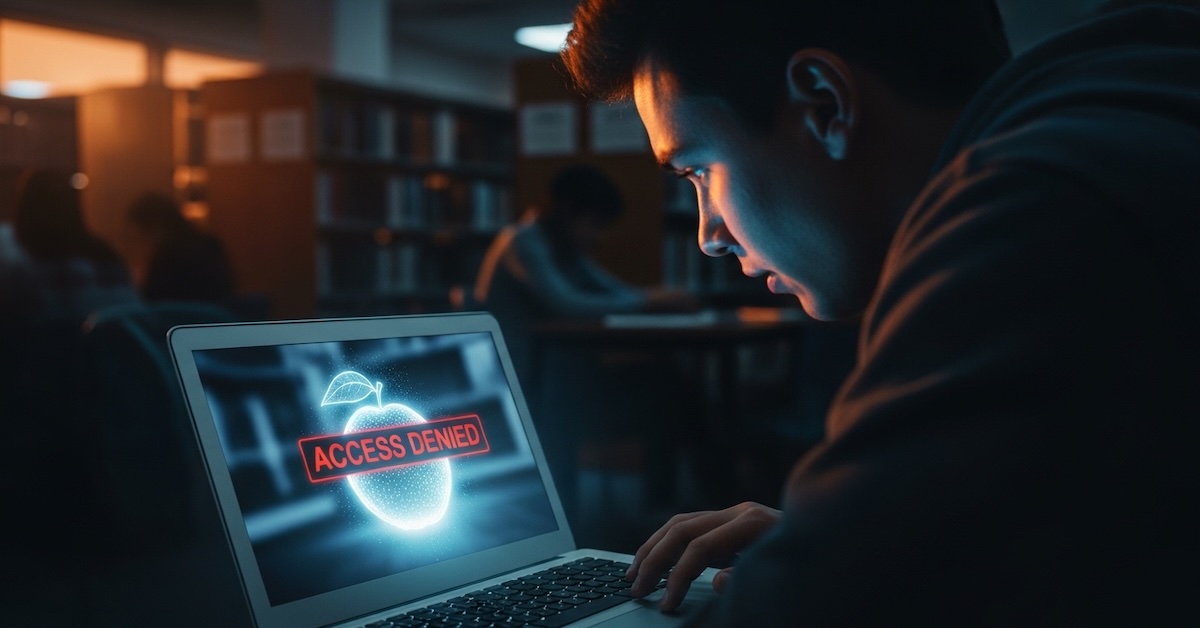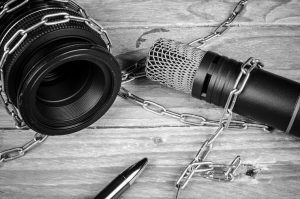The Psychology of Media Censorship
Censorship creates a "forbidden fruit" psychological effect where restricted information becomes more attractive and valuable. Research shows that when people learn content will be banned, they become more interested in it and more likely to agree with its message, even without viewing it. This phenomenon, known as the scarcity principle, explains why government censorship often backfires and makes suppressed information more desirable.

 Patrick Mattimore is a member of the Society of Professional Journalists and has written commentaries for a variety of publications, daily newspapers, professional magazines, and weeklies.
Patrick Mattimore is a member of the Society of Professional Journalists and has written commentaries for a variety of publications, daily newspapers, professional magazines, and weeklies.
His areas of expertise are law, psychology, and education. He taught high school psychology for many years in the US and was an adjunct professor of law in the Temple University/Tsinghua University LLM program in Beijing, where he also taught psychology at a private college.
While living in China (2009-2012), Patrick authored an award-winning online column for China Daily and was the sole foreign writer invited to tour China as part of a national tour of online writers. He wrote an "expert's take" on the media for China Daily's 30th anniversary edition. He also frequently wrote for another English newspaper, The Global Times. In Phuket, Thailand, Patrick wrote a regular psychology column ("On Your Mind") for the weekly newspaper, the Phuket Gazette. His columns frequently addressed the relevance of a particular psychological principle (or principles) to a current news event.
Table of Contents

Patrick Mattimore has a lot to say on the subject of censorship. He also has the education and the professional adeptness to back it up. Raised in the United States, Patrick is now retired and living in Pattaya, Thailand.
Below are some of Patrick Mattimore's thoughts regarding the psychological effects of censorship.
Editorial Note: This article features expert opinion and commentary from Patrick Mattimore, an authority in media psychology and censorship. The views expressed represent his professional insights based on lived experience and psychological research. This content is intended for educational purposes and does not constitute professional psychological advice.
Understanding the Psychological Effects of Censorship
The psychological effects of censorship go far beyond simply limiting access to information. When governments or organizations attempt to suppress content, they trigger fundamental human psychological responses that often work against their intended goals.
At the core of censorship's psychological impact is the scarcity principle, a well-documented phenomenon in behavioral psychology. When something becomes less available, people perceive it as more valuable. This applies to everything from consumer products to information. When governments ban books, block websites, or suppress news stories, they inadvertently increase the perceived value and desirability of that content.
Research has consistently shown that censorship can also increase agreement with suppressed viewpoints. In one landmark study, when University of North Carolina students learned a speech opposing coed dorms would be banned, they became more opposed to coed dorms themselves without ever hearing the speech. The act of censorship alone shaped their opinions more powerfully than the actual content could have.
This creates a paradox for governments and organizations that rely on censorship. The tighter they control information, the more attractive that information becomes to citizens. The psychological drive to access forbidden content often proves stronger than the fear of consequences for seeking it out. Understanding censorship psychology is part of the broader study of the impact of media on society and human behavior.
Expert Insights: Patrick Mattimore on Censorship Psychology
What motivated you to research and then write about the influences and the psychological effects of censorship?
Writing in China, I obviously had preconceptions about what I could or could not write. I also felt that I needed to approach China with fresh eyes. That led me to question many assumptions I had grown up with. One of those assumptions was that (A) the press in the West was free, and the East it was not. A corollary assumption is that a free press is necessarily a good thing. But as I thought about the issue I realized that a lot of "freedom" in the West meant that stories were often told from many different perspectives, with loads of biases, and a busload of lies and falsehoods thrown in. So, much of what I wrote about was in praise of the communist press, which, while censoring many voices, was at least dependable in getting a clear voice out. I would typically temper that "praise" by suggesting that a single voice came with its own set of liabilities. The takeaway message, however, is that China and Thailand, as well, although subject to censorship, really aren't able to blot out all of the messages.
I also liked introducing the idea that censoring something makes it more attractive from a psychological standpoint. I wrote about that aspect for both the Chinese and the Thai press, and I also wrote a column recently for The Bay Area News Group on this subject.
Can you expand on this? Specifically, the influences of censorship in China and/or Thailand?
Reporters Without Borders does an annual ranking of press freedom in about 180 countries. China ranks in the bottom five countries, and Thailand is in the lowest third (and dropping), which will likely accelerate as a result of the martial law imposed in Thailand a year and a half ago. In China, there are a number of topics that are essentially off-limits – free Tibet, the Falun Gong, independent Taiwan, criticism of party leaders and their policies generally, unequal treatment of minorities or inadequate government responses to their problems, etc. China will black out sites when they don't like what the messenger has written. The New York Times, for example, has been blacked out for about three years ever since they wrote an article suggesting that one of the Chinese leaders' families was reaping profits as a result of his position. Thailand, too, has a couple of topics that are off limits – primarily criticism of the royal family, which is a crime. In both countries, information can be accessed through the use of VPN's (Virtual Private Networks, which allow people to communicate private information securely over public networks). It's also interesting to note that the English press has more freedom than the native media in both countries.
How are people coping with censorship in China? Have they found ways "around" it?
Young people, particularly, gain access to Western media using VPN's. For the most part, people don't seem to concern themselves much with what the government does. That said, my sense is that censorship is like telling Eve not to eat the apple. Even without the serpent around to entice her, she is going to want the apple. One of the best endorsements for novelists around the turn of the 20th century was when a novel was "banned in Boston." Prohibiting things makes them more attractive. So the impact on people in China and Thailand is that people will either find a way around the censors or believe that the West (where offensive material is not censored) must really be a better place to live. The general take away message for governments should be to avoid trying to censor things.
You mentioned that using principles of psychological science could result in good decision-making. Can you explain this?
Psychological science can help us understand, predict, and modify behavior. It can help us critically analyze information with a goal of making informed judgments. For example, China has the highest number of cigarette smokers and smoking related deaths in the world. But it's a problem that has a curious psychological twist because, unlike in most other parts of the world, smoking is gender specific in China. That is, over 50% of the male adult population smokes, but only 2% of females smoke. So, if one were to work on eradicating that particular problem, it would probably be wise to approach the gender issue first and foremost. (Of course, a complicating factor is that the government realizes huge revenues in taxes from the sales of cigarettes, but that is a different issue.)
What makes government censorship of the press and resultant self-censorship by media itself even more baffling, is that psychological science suggests that it doesn't work. If you want to make an idea, or nearly anything, more valuable to someone, make it less available by censoring it.
For example, more than 40 years ago, when University of North Carolina students learned that a speech opposing coed dorms on campus would be banned, psychologists reported that the students became more opposed to the idea of coed dorms. Without ever hearing the speech, students became more sympathetic to its argument.
Advertisers have long been aware of the power of prohibitory admonitions to promote products, enticing consumers by advising them to not taste the forbidden fruit. Before advertisers for Charmin bathroom tissue exhorted customers: "Please don't squeeze the Charmin," it's likely no one ever had.
By ordering stories covered up, the government ensures that those stories will be accorded more importance than they warrant. By limiting individuals' access to information, that information becomes more attractive. Psychologist Robert Cialdini calls this the principle of scarcity. We want those things that are hard to get even though there is logically no more reason to want a scarce item than a plentiful one.
Placing restrictions on the press or forcing the media to self-censor may temporarily put a lid on the information jar, but, inevitably, the information will get out. The tighter the government twists the lid, the more chance the jar will shatter in its face.
Final thought: it's very difficult to censor media or silence people, as social connections will most always find a way around it.
Censorship Approaches: A Global Comparison
| Region/Country | Censorship Level | Primary Methods | Psychological Impact |
|---|---|---|---|
| China | Severe (Bottom 5 globally) | Website blackouts, social media monitoring, VPN restrictions, topic bans (Tibet, Taiwan, government criticism) | High scarcity effect, widespread VPN use, increased interest in Western media, belief that censored information must be valuable |
| Thailand | High (Lowest third globally) | Royal family criticism laws, martial law restrictions, limited press freedom, website blocking | Self-censorship by media, VPN adoption, English press has more freedom, forbidden fruit effect for royal family topics |
| Western Democracies | Low to Moderate | Editorial discretion, fact-checking, platform moderation, limited government intervention | Multiple perspectives available, information overload, trust issues from conflicting sources, less scarcity-driven information seeking |
| Social Media Platforms (Global) | Selective/Content-based | Algorithm-based suppression, community guidelines, content removal, shadow banning | Controversy increases engagement, "cancel culture" amplifies suppressed voices, perception of bias creates distrust |
The Scarcity Principle in Action
The scarcity principle, identified by psychologist Robert Cialdini, is one of the most powerful forces in human psychology. It explains why limited-edition products sell out instantly, why exclusive clubs are more desirable, and why censored information becomes irresistible.
When something becomes scarce or restricted, our brains assign it higher value automatically. This isn't a conscious decision but a deeply ingrained psychological response. In the context of censorship, this means that banned books become bestsellers, blocked websites see traffic surge when people find workarounds, and forbidden ideas spread faster than freely available ones.
The advertising industry has exploited this principle for decades. Phrases like "limited time only," "while supplies last," and "exclusive access" trigger the scarcity response. The famous Charmin campaign, "Please don't squeeze the Charmin," worked because it used reverse psychology; the prohibition itself made people want to squeeze the product.
For governments attempting to control information, the scarcity principle creates an impossible situation. Every act of censorship increases the perceived value of the censored content. Citizens who might have ignored freely available information become obsessed with accessing it once it's restricted. The very act of trying to suppress information ensures its wider spread and greater impact.
This psychological reality explains why censorship so often backfires. The University of North Carolina study on coed dorms showed that people don't even need to access forbidden content for it to influence them. Simply knowing something is banned makes people more sympathetic to it and more likely to seek it out. If you're interested in pursuing this field professionally, learn more about the employment outlook and career guidance for media psychologists.
Frequently Asked Questions
What are the main psychological effects of censorship?
The primary psychological effect is the "forbidden fruit" phenomenon, where restricted information becomes more attractive and valuable. Censorship triggers the scarcity principle, causing people to assign higher importance to banned content. It can also increase agreement with suppressed viewpoints, even without people accessing the actual content. People develop stronger curiosity about censored topics and often become more sympathetic to banned perspectives.
Why does censorship make banned content more attractive?
This occurs because of the scarcity principle in psychology. Our brains automatically assign higher value to things that are rare or hard to obtain. When governments ban information, they make it scarce, which triggers this psychological response. Additionally, censorship suggests the information must be powerful or important; otherwise, authorities wouldn't bother suppressing it. This perception alone increases desirability.
How do people in censored countries access restricted information?
People primarily use Virtual Private Networks (VPNs) to bypass government blocks and access restricted content. VPNs allow users to route their internet connection through servers in other countries, making it appear they're accessing content from an unrestricted location. Social connections and word-of-mouth also help spread information that governments try to suppress. In countries like China and Thailand, English-language press often has more freedom than native media, providing another avenue for information access.
Does censorship effectively control information flow?
Research and real-world evidence suggest censorship is largely ineffective at controlling information in the long term. While it may temporarily limit access, the psychological effects often backfire. Censorship increases interest in banned content, motivates people to find workarounds, and makes suppressed information spread faster through underground channels. As Patrick Mattimore notes, social connections almost always find a way around censorship, and the tighter governments try to control information, the more likely their efforts will fail.
What is the scarcity principle in psychology?
The scarcity principle, identified by psychologist Robert Cialdini, states that people assign higher value to things that are rare or difficult to obtain. When something becomes less available, we perceive it as more valuable, desirable, and important, even if the actual quality or content hasn't changed. This principle applies to products, opportunities, and information. In censorship contexts, it means that banned or restricted information automatically becomes more attractive simply because it's harder to access.
How can psychological science inform media policy decisions?
Psychological science helps policymakers understand how people actually respond to censorship versus how they're expected to respond. Research shows that prohibition often increases interest rather than decreasing it. Good policy would account for the scarcity principle, the forbidden fruit effect, and human curiosity. Rather than trying to suppress information, more effective approaches might involve promoting critical thinking skills, providing context, and ensuring multiple perspectives are available. Understanding these psychological principles can help governments avoid policies that backfire and achieve their actual goals more effectively.
Key Takeaways
- Censorship creates a "forbidden fruit" effect where restricted information becomes more attractive and valuable due to the psychological scarcity principle.
- Research demonstrates that people become more sympathetic to banned viewpoints even without accessing the actual content, simply because it's been censored.
- Countries with heavy censorship, like China and Thailand, see widespread VPN use as citizens find ways to access restricted information through social connections and technolo.gy
- The advertising industry has successfully exploited the scarcity principle for decades, showing that prohibition increases desire for products and informat.ion
- Psychological science consistently shows that censorship backfires; as the tighter governments try to control information, the more attractive and valuable that information becomes to citizens.
- Understanding media psychology and censorship effects is crucial for developing effective communication policies and for careers in media psychology.
Explore Media Psychology Careers
Interested in studying how media, communication, and censorship affect human behavior? Discover degree programs and career paths in media psychology.
A QUICK LOOK AT PATRICK MATTIMORE'S CREDENTIALS
Occupation: Writer, teacher, and adjunct-professor, currently retired, living in Pattaya, Thailand
Education
Undergraduate: Dartmouth College, 1972
Graduate: University of California, Hastings College of the Law, 1983
References
http://www.chinadaily.com.cn/opinion/2011-01/06/content_11802828.htm
http://www.chinadaily.com.cn/china/cd30thanniversary/2011-06/01/content_12620880.htm
http://www.opednews.com/articles/Behind-the-great-Firewall-by-Patrick-Mattimore-110904-867.html
http://faculty.washington.edu/kwchan/Chan-SCMPpage.pdf
Learn more about becoming a media psychologist and media psychology degrees.






